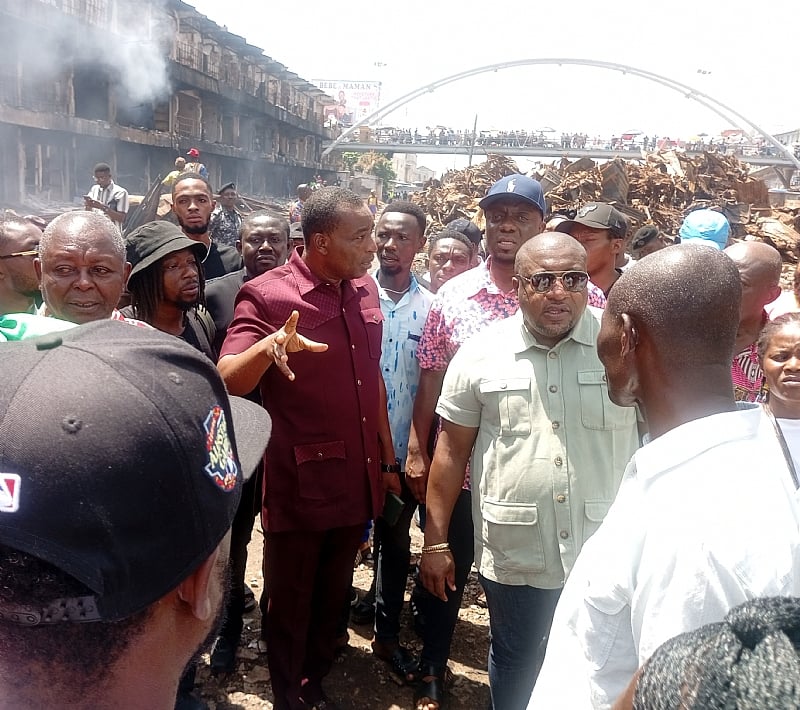The New Patriotic Party (NPP), Ghana’s primary opposition party, demonstrated its commitment to supporting the fire-stricken traders of Kumasi’s Adum Blue Light market with a significant donation and a public call for government assistance. Following a devastating fire that ravaged the market, the NPP’s National Executive Council (NEC) donated GH₵100,000 to the affected traders. This gesture of solidarity was accompanied by a visit to the scene of the disaster, led by the party’s General Secretary, Justin Kodua, along with other prominent party figures. The visit allowed the NPP leadership to witness the extent of the damage firsthand and directly interact with the traders, demonstrating empathy and concern for their plight.
Kodua’s presence served as a platform not only for offering financial aid but also for advocating for the traders’ needs. He urged the ruling National Democratic Congress (NDC) government to step up and provide seed money to facilitate the market’s reconstruction. However, he expressed strong reservations about the government’s proposed plan to directly manage the rebuilding process. Kodua argued that such an approach would likely be bogged down by bureaucratic delays and red tape, potentially leaving the traders in limbo for years. Instead, he emphasized the traders’ own desire and capability to rebuild their businesses, advocating for government support to be channeled directly to them. This, he asserted, would be a more efficient and empowering approach, allowing the traders to reclaim their livelihoods more swiftly.
The NPP’s stance reflects a belief in the power of individual initiative and a critique of potential government inefficiency. Kodua’s argument centered on the principle that those directly affected by the disaster are best positioned to understand their needs and oversee the rebuilding process. This approach, he suggested, would not only be faster but also foster a sense of ownership and resilience within the trading community. He highlighted the traders’ readiness and willingness to rebuild, contrasting their proactive stance with the potential for government-led reconstruction to become a protracted and cumbersome process. The NPP’s call, therefore, represents a blend of practical concern for the traders’ immediate needs and a broader political statement about the role of government versus individual agency.
The donation itself, while substantial, was presented as just the beginning of the NPP’s support for the traders. Kodua emphasized the party’s ongoing commitment to their well-being, reassuring them that the NPP would continue to advocate for their needs and mobilize further resources. He pledged to convene the NEC to explore avenues for raising additional funds, demonstrating the party’s resolve to provide sustained assistance beyond the initial donation. This commitment transcends the immediate aftermath of the fire, signaling a long-term investment in the traders’ recovery and the market’s revitalization.
The NPP’s actions in the wake of the Adum Blue Light market fire illustrate a multifaceted approach to disaster response. Beyond the immediate financial contribution, the party sought to amplify the voices of the affected traders, advocating for a rebuilding strategy that empowers them and minimizes bureaucratic hurdles. By presenting the traders’ perspective and challenging the government’s intended approach, the NPP positioned itself as a champion for the affected community while simultaneously critiquing the ruling party’s methods. This approach allowed the NPP to offer both tangible support and a political message, combining practical assistance with a broader commentary on governance and responsiveness to public need.
In essence, the NPP’s response to the Kumasi market fire transcends a simple act of charity. It represents a strategic blend of humanitarian aid, political advocacy, and community engagement. By donating funds, visiting the site, and publicly championing the traders’ preferred rebuilding strategy, the NPP aims to solidify its position as a responsive and supportive force within the community. Their actions are a testament to the power of political parties to not only represent their constituents but also to act as advocates and catalysts for recovery in times of crisis. This incident highlights the role opposition parties can play in holding the government accountable while simultaneously providing direct support to those in need, demonstrating a proactive approach to community engagement and disaster response.














